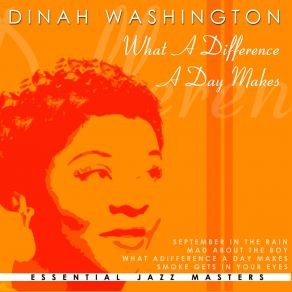What a Diff'rence a Day Makes
Download links and information about What a Diff'rence a Day Makes by Dinah Washington. This album was released in 1959 and it belongs to Blues, Jazz, Vocal Jazz, Pop genres. It contains 16 tracks with total duration of 46:55 minutes.

|
|
|---|---|
| Artist: | Dinah Washington |
| Release date: | 1959 |
| Genre: | Blues, Jazz, Vocal Jazz, Pop |
| Tracks: | 16 |
| Duration: | 46:55 |
| Buy it NOW at: | |
| Buy on iTunes $9.99 | |
| Buy on iTunes $9.99 | |
| Buy on Amazon $7.99 | |
Tracks
[Edit]| No. | Title | Length |
|---|---|---|
| 1. | September In The Rain | 2:11 |
| 2. | Dream | 2:42 |
| 3. | Such A Night | 2:33 |
| 4. | Tell Me Why | 2:57 |
| 5. | I Concentrate On You | 3:02 |
| 6. | Mad About The Roy | 2:49 |
| 7. | Trust In Me | 3:01 |
| 8. | Manhattan | 4:17 |
| 9. | What A Diff'rence A Day Makes | 2:32 |
| 10. | Harbour Lights | 2:37 |
| 11. | I Won't Cry Anymore | 3:22 |
| 12. | Soft Winds | 3:02 |
| 13. | Our Love Is Here To Stay | 2:31 |
| 14. | That's All I Want From You | 2:52 |
| 15. | If It's The Last Thing I Do | 3:05 |
| 16. | Smoke Gets In Your Eyes | 3:22 |
Details
[Edit]One of the more notorious albums in the history of vocal music, What a Diff'rence a Day Makes! is the lush session that bumped up Dinah Washington from the "Queen of the Blues" to a middle-of-the-road vocal wondress — and subsequently disenfranchised quite a few jazz purists. Washington had been praised in the same breath as Holiday and Fitzgerald for more than a decade, but Mercury nevertheless decided to back her with mainstream arrangements (by Belford Hendricks), heavy strings, and wordless vocal choruses similar to the radio hits of the day. Apparently, the mainstream backings didn't faze Washington at all; she proves herself with a voice as individual and evocative as ever. To be honest, the arrangements are quite solid for what they're worth; though it's a bit jarring to hear Washington's voice wrapped in sweet strings, the effect works well more frequently than not. Most of the songs here are familiar standards ("I Remember You," "I Thought About You," "Cry Me a River," "Manhattan," "Time After Time"), but they've been transformed by Washington as though they'd never been sung before. The Top Ten title track is by no means the best song on the album, but its title proved prophetic for Washington's career. Though her vocal style hadn't changed at all, one day she was a respected blues singer; the next, according to most of the jazz cognoscenti, she had become a lowbrow pop singer. Thankfully, the evidence against Washington's "transformation" is provided right here.